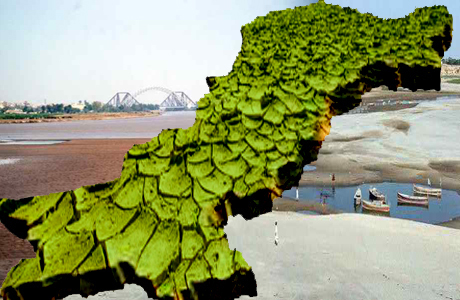Experts warn Pakistan of acute water
shortages
By: Samaa Report
 In
an ironic twist to Pakistan's struggles with extreme
weather, experts warn that the increasingly frequent.
In
an ironic twist to Pakistan's struggles with extreme
weather, experts warn that the increasingly frequent.
And intense flooding in
the country could lead to catastrophic water shortages.
The problem, climate and water experts say, is a
worsening lack of groundwater.
Groundwater resources,
used to supply Pakistan's growing population with water for
agriculture, drinking and sanitation, are depleting rapidly.
Such underground reserves
usually are replenished naturally by rain and melting snow.
But experts warn that the short, intense rainfall that is
becoming common during Pakistan's monsoon season between
June and September results in more runoff, giving the water
less time to percolate into the ground.
Scientists at the Pakistan Meteorological Department say
weak and moderate rainfall provides the most groundwater
recharge - but unfortunately that type of weather is
becoming a rarity, they say.
"The frequency and intensity of extreme rainfall events are
very likely to escalate and their increasing trend is
already quite visible in different parts of Pakistan," said
Ghulam Rasul, a senior weather scientist and climatologist
at the meteorological department.
"Because of the high intensity rainfall on steep, sloped
land areas in the country's northwestern and northeastern
parts, groundwater recharge is minimal," he said.
HIGH ON WATER STRESS
RANKINGS
Pakistan already suffers from worsening water shortages. In
December 2013, the World Resources Institute ranked Pakistan
among the 36 most water-stressed countries in the world.
A recent report by the Planning Commission of Pakistan,
based on data from the Water and Power Development Authority
of Pakistan, shows that in 1951 per capita water
availability in Pakistan was 5,650 cubic meters.
By 2010, that figure had plunged to 1,000 cubic meters and
is expected to further fall to 800 cubic meters by 2025,
when Pakistan's population is expected to hit 221 million,
the report said.
If groundwater depletion continues at its current rate,
experts say, the country could be headed for widespread
water poverty.
According to Siddiq Ahmed Khan, country head of Water-Aid
UK's Pakistan chapter, any decline in the groundwater
recharge could have a severe impact on water available for
drinking, sanitation and hygiene in a country where over 1.2
million people die every year from water-borne diseases such
as diarrhea, malaria, and typhoid.
"The persistent deterioration of surface and groundwater
sources, on which people rely for their livelihoods,
drinking, sanitation and daily domestic needs, means that
water and sanitation pressures will simply grow from bad to
worse," he said.
AGRICULTURE, URBANISATION
PRESSURES
While erratic rainfall patterns are exacerbating Pakistan's
groundwater shortage, extreme weather is not solely to
blame.
Nearly 1.1 million agricultural wells in the country are
"among the major causes of the rapidly depleting groundwater
levels," said Muhammad Javed, deputy director of Pakistan's
Irrigation Research Institute.
Spreading urbanisation also means more pavement and less
chance for water to percolate into the ground, said Daanish
Mustafa, professor of water-resources geography and
environmental management at King's College London who
co-authored the 2013 report "Understanding Pakistan's
water-security nexus".
According to Pakistan Water Gateway, a non-governmental
water-research portal, groundwater levels in the country are
dropping by three feet annually.
Using the sprawling city of Lahore in northeastern Pakistan
as an example, the Gateway notes that 20 years ago water
used to be extracted from a depth of between 20 and 40 feet.
Today, wells must reach 800 feet to get sufficient amounts
of useable water.
Since the cost of pumping groundwater increases as the water
table goes down, Pakistanis are being forced to use more
expensive and poorer quality groundwater, the experts say.
"This scenario calls for efforts to check groundwater
depletion," said Pervaiz Amir, water-policy expert and
country director of the Pakistan Water Partnership, a
chapter of the Geneva-based Global Water Partnership.
SOLUTIONS?
But the flooding that is exacerbating the problem could
become part of the solution, Amir said, if floodwaters are
captured in "new small- and medium-sized water storage
reservoirs in villages, towns and around urban centers."
Such reservoirs could make up for lost groundwater, with
captured rainwater used to supplement underground aquifers
and irrigate farms, water-management experts say.
Measures including slowing urbanisation, improving water
governance, promoting water-saving technology to farmers and
industry, and rainwater harvesting could also help, Amir
said.
November, 2014
Source: Samaa